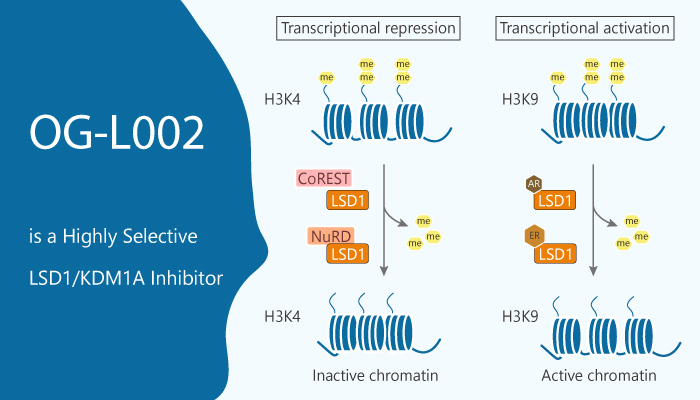LSD1 is an important histone demethylase. LSD1 overpresses in many malignancies, including some leukemia, breast, small-cell lung, colorectal, prostate, neuroblastoma, and bladder cancers. Moreover, LSD1 is also an important component of the transcriptional regulatory complexes, it can activate HSV and HIV gene expression in the initial stages. In addition, LSD1 limits the cell-mediated deposition of histone H3K9 repressive methylation of the invading viral genome.
In this article, we will introduce a potent and highly selective LSD1 inhibitor, OG-L002. As well as, OG-L002 is a monoamine oxidase (MAO) inhibitor.

Firstly, in vitro, in LSD1 demethylation assay using purified LSD1 protein. Compound OG-L002 potently inhibits the expression of viral IE (ICP27 and ICP4) genes, but not cellular control genes. OG-L002 is highly specific to LSD1 (IC50, ~0.02 µM). In contrast, control inhibitors are more specific to MAO-A (clorgyline) or MAO-B (safinamide) and do not show suppression on viral IE gene expression.
Nextly, in MTT cytotoxicity assays. OG-L002 inhibits viral IE gene expression in both HeLa and HFF cells. This compound exhibits IC50 values of 10 µM in HeLa cells and 3 µM in HFF cells relative to the control MAOI TCP (IC50, ~1 mM).
Lastly, in vivo in BALB/c mice. OG-L002 (6 to 40 mg/kg of body weight/day) treats for 7 days followed by infection with a lethal dose of HSV (90% lethal dose [LD90]).) This compound reduces the levels of detectable viral genomes in the ganglia in a dose-dependent manner at both 3 and 5 days postinfection.
In conclusion, OG-L002, as an LSD1 and MAO inhibitor, it shows its efficacy in vitro and in vivo. OG-L002 inhibits HSV IE gene expression in cell culture. And it increases repressive chromatin assembly on viral IE gene promoters in vitro. Furthermore, OG-L002 inhibits viral lytic infection and suppresses HSV reactivation from latency at significantly reduced compound levels in vivo.
Reference:
Liang Y, et al. mBio. 2013 Feb 5;4(1):e00558-12.